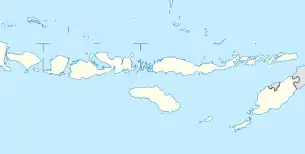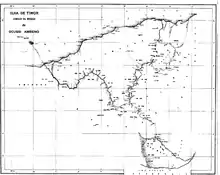Tunbaba
Tunbaba war ein traditionelles Reich in Westtimor.[1] Es liegt östlich der osttimoresischen Exklave Oe-Cusse Ambeno. Hauptort war Kaenbaun.[2]
 Kaenbaun (Kleine Sundainseln)
| |
Tunbaba im Norden Timors |

Karte von 1914 mit Tunbaba, östlich von Oe-Cusse Ambeno
1899 kam es zu bewaffneten Auseinandersetzungen zwischen den Einheimischen aus dem portugiesischen Oe-Cusse Ambenound jenen aus dem niederländischen Tunbaba, wo es noch reiche Sandelholzvorkommen gab. Die endgültige Grenzziehung zwischen den Kolonialmächten Portugal und Niederlande erfolgte mit den Verträgen von 1904 und 1916.[3]
Heute gehört das Gebiet zum indonesischen Distrikt Ostmiomaffo im Regierungsbezirk (Kabupaten) Nordzentraltimor.
In Taekas (Taikas), einem kleinen Dorf in Tunbaba, wurde 1960 Dominikus Saku geboren, der Bischof von Atambua.
Literatur
- H. G. Schulte Nordholt: The political system of the Atoni of Timor, Nijhoff 1971.
Einzelnachweise
- Malcolm Cairns (Hrsg.): Voices from the Forest: Integrating Indigenous Knowledge into Sustainable Upland Farming
- YOHANES DJAROT PURBADI: The Clan Formation and the Spatial Formation on Dawanese Settlement Architecture of Kaenbaun Village in Timor Island, S. 3.
- Laura Suzanne Meitzner Yoder: Custom, Codification, Collaboration: Integrating the Legacies of Land and Forest Authorities in Oecusse Enclave, East Timor, S. 84 ff., Dissertation, Yale University, 2005 (PDF-Datei; 1,46 MB (Memento vom 7. März 2007 im Internet Archive)).
This article is issued from Wikipedia. The text is licensed under Creative Commons - Attribution - Sharealike. The authors of the article are listed here. Additional terms may apply for the media files, click on images to show image meta data.